 W
WThe European Union itself does not issue ordinary passports, but ordinary passport booklets issued by its 27 member states share a common format. This common format features a coloured cover emblazoned—in the official language(s) of the issuing country —with the title "European Union", followed by the name(s) of the member state, the heraldic "Arms" of the State concerned, the word "PASSPORT", together with the biometric passport symbol at the bottom centre of the front cover.
 W
WAn Austrian passport is issued to citizens of Austria to facilitate international travel. Every Austrian citizen is also a citizen of the European Union. The passport, along with the national identity card allows for free rights of movement and residence in any of the states of the European Economic Area and Switzerland.
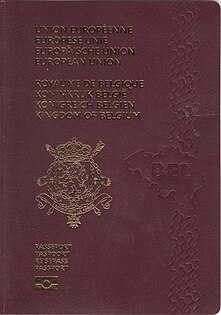 W
WA Belgian passport is a travel document issued by the Belgium to Belgian citizens to facilitate international travel. It grants the bearer international passage in accordance with visa requirements and serves as proof of citizenship.
 W
WA British passport is a travel document issued by the United Kingdom or other British dependencies and territories to individuals holding any form of British nationality. It grants the bearer international passage in accordance with visa requirements and serves as proof of citizenship. It also facilitates access to consular assistance from British embassies around the world. Passports are issued using royal prerogative, which is exercised by Her Majesty's Government. British citizen passports have been issued in the UK by Her Majesty's Passport Office, a division of the Home Office, since 2006. All passports issued in the UK since 2006 have been biometric.
 W
WBulgarian passport is an international travel document issued to nationals of Bulgaria, and may also serve as proof of Bulgarian citizenship. Besides enabling the bearer to travel internationally and serving as indication of Bulgarian citizenship, the passport facilitates the process of securing assistance from Bulgarian consular officials abroad or other European Union member states in case a Bulgarian consular is absent, if needed.
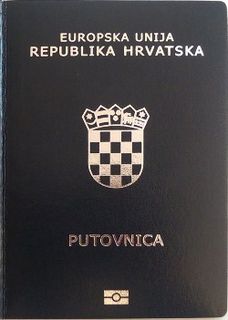 W
WCroatian passport is issued to citizens of the Republic of Croatia for the purpose of international travel. The passport has the purpose of serving as proof of Croatian citizenship and identity. Responsibility for their issuance lies with the Ministry of the Interior; and for citizens abroad, passports are issued by the local embassy or consulate. Croatian passports are valid for ten or five years, and are not renewable. Every Croatian citizen is also a citizen of the European Union. The passport, along with the national identity card allows for free rights of movement and residence in any of the states of the European Economic Area and Switzerland.
 W
WThe Czech passport is an international travel document issued to nationals of the Czech Republic, and may also serve as proof of Czech citizenship. Besides enabling the bearer to travel internationally and serving as indication of Czech citizenship, the passport facilitates the process of securing assistance from Czech consular officials abroad or other European Union member states in case a Czech consular is absent, if needed.
 W
WDanish passports are issued to citizens of the Kingdom of Denmark to facilitate international travel. Besides serving as proof of Danish citizenship, they facilitate the process of securing assistance from Danish consular officials abroad.
 W
WDutch passports are issued to citizens of the Kingdom of the Netherlands for the purpose of international travel. As the Netherlands only distinguish one category of citizen, for all countries in the Kingdom, passports are the same for all four countries. The passport also serves as a means of identification as required by the Dutch law since 1 January 2005 for all persons over the age of fourteen. Dutch passports are valid for a period of ten years from issuing date. The passport complies with the rules for European Union passports. Since 26 August 2006 all passports are issued as a biometric passport with an embedded contactless smartcard RFID chip for storing biometric data. Every Dutch citizen is also a citizen of the European Union. The nationality allows for free rights of movement and residence in any of the states of the European Union, European Economic Area, and Switzerland.
 W
WAn Estonian passport is an international travel document issued to citizens of Estonia, and may also serve as proof of Estonian citizenship. Besides enabling the bearer to travel internationally and serving as indication of Estonian citizenship, the passport facilitates the process of securing assistance from Estonian consular officials abroad or other European Union member states in case an Estonian consular is absent, if needed. If an Estonian citizen wishes to receive an identity document, especially an Estonian passport, somewhere other than the foreign representation of the Republic of Estonia, then the bearer of the Estonian citizenship staying abroad could receive the travel documents in embassies of any EU country worldwide by paying 50 Euro. Many countries require passport validity of no less than 6 months and one or two blank pages.
 W
WDanish passports are issued to citizens of the Kingdom of Denmark to facilitate international travel. Besides serving as proof of Danish citizenship, they facilitate the process of securing assistance from Danish consular officials abroad.
 W
WFinnish passports are issued to nationals of Finland for the purpose of international travel. Aside from serving as proof of Finnish nationality, they facilitate the process of securing assistance from Finnish consular officials abroad.
 W
WA French passport is an identity document issued to French citizens. Besides enabling the bearer to travel internationally and serving as indication of French citizenship, the passport facilitates the process of securing assistance from French consular officials abroad or other European Union member states in case a French consular is absent, if needed.
 W
WGerman passports are issued to nationals of Germany for the purpose of international travel. A German passport is, besides the German ID card and the German Emergency Travel Document, the only other officially recognised document that German authorities will routinely accept as proof of identity from German citizens. Besides serving as proof of identity and presumption of German nationality, they facilitate the process of securing assistance from German consular officials abroad. German passports are valid for ten years or six years and share the standardised layout and burgundy red design with other EU passports. Every German citizen is also a citizen of the European Union. The passport, along with the national identity card, allows for free rights of movement and residence in any of the states of the European Union, European Economic Area and Switzerland.
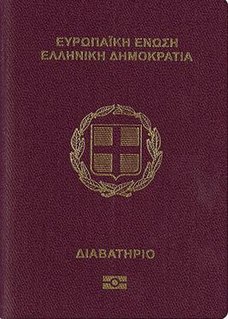 W
WGreek passports are issued exclusively to Greek citizens for the purpose of international travel. Biometric passports have been issued since 26 August 2006, with old-style passports being declared invalid as of 1 January 2007. Since June 2009, the passport's RFID chip includes two index fingerprints as well as a high-resolution JPEG image of the passport holder. Every Greek citizen is also a citizen of the European Union. The passport, along with the national identity card allows for free rights of movement and residence in any of the states of the European Union, European Economic Area, and Switzerland.
 W
WDanish passports are issued to citizens of the Kingdom of Denmark to facilitate international travel. Besides serving as proof of Danish citizenship, they facilitate the process of securing assistance from Danish consular officials abroad.
 W
WHungarian passports are issued to Hungarian citizens for international travel by The Central Data Processing, Registration and Election Office of the Hungarian Ministry of the Interior. Every Hungarian citizen is also a citizen of the European Union. The passport, besides the national identity card allows for free rights of movement and residence in any of the states of the European Union, European Economic Area and Switzerland.
 W
WAn Irish passport is the passport issued to citizens of Ireland. An Irish passport enables the bearer to travel internationally and serves as evidence of Irish nationality and citizenship of the European Union. It also facilitates the access to consular assistance from both Irish embassies and any embassy from other European Union member states while abroad.
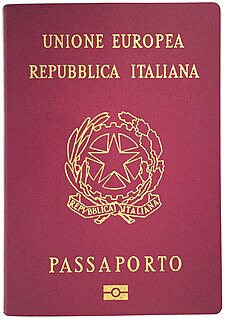 W
WItalian passports are issued to Italian citizens for the purpose of international travel. Biometric passports have been available since 26 October 2006, are valid for 10, 5 or 3 years. Every Italian citizen is also a citizen of the European Union. The passport, along with the national identity card allows for free rights of movement and residence in any of the states of the European Union, European Economic Area as well as Switzerland.
 W
WThe Jersey-variant British passport is a type of British passport issued in the British Crown dependency of Jersey by the Passport Office in St Helier.
 W
WLatvian passports are issued to citizens of Latvia for identity and international travel purposes. Receiving a valid passport is mandatory from the age of 15, but passports can be requested for younger children if needed for travel and other purposes. A passport is valid for 10 years if the citizen is 20 or older, for 5 years if 5–20 and for 2 years if 0–5 years old. Non-citizen passports, and refugee travel documents, are also issued. Every Latvian citizen is also a citizen of the European Union. The passport, along with the national identity card, allows Latvian citizens to travel and to have rights of free movement and rights to reside in any states of the European Union, European Economic Area and Switzerland.
 W
WLithuanian passport is an official document, issued exclusively to Lithuanian citizens to identify themselves as such and/or to facilitate travel outside Lithuania. Every Lithuanian citizen is also a citizen of the European Union. The Lithuanian passport, along with the national identity card allows for free rights of movement and residence in any of the states of the European Union, European Economic Area and Switzerland.
 W
WA Luxembourgish passport is an international travel document issued to nationals of the Grand Duchy of Luxembourg, and may also serve as proof of Luxembourgish citizenship. Besides enabling the bearer to travel internationally and serving as indication of Luxembourgish citizenship, the passport facilitates the process of securing assistance from Luxembourgish consular officials abroad or other European Union member states in case a Luxembourgish consular is absent, if needed.
 W
WThe Maltese passport is a passport that is issued to citizens of the Republic of Malta. Every Maltese citizen is also a citizen of the European Union and a Commonwealth citizen. The passport, along with the national identity card, allows for free rights of movement and residence in all member states of the European Economic Area, as well as Switzerland.
 W
WSince the 1980s, member states of the European Union have started to harmonise aspects of the designs of their ordinary passports, as well as common security features and biometrics.
 W
WA Polish passport is an international travel document issued to nationals of Poland, and may also serve as proof of Polish citizenship. Besides enabling the bearer to travel internationally and serving as indication of Polish citizenship, the passport facilitates the process of securing assistance from Polish consular officials abroad or other European Union member states in case a Polish consular is absent, if needed.
 W
WPortuguese passports are issued to citizens of Portugal for the purpose of international travel. The passport, along with the Citizen Card allows for free rights of movement and residence in any of the states of the European Union, European Economic Area and Switzerland.
 W
WRomanian passport is an international travel document issued to nationals of Romania, and may also serve as proof of Romanian citizenship. Besides enabling the bearer to travel internationally and serving as indication of Romanian citizenship, the passport facilitates the process of securing assistance from Romanian consular officials abroad or other European Union member states in case a Romanian consular is absent, if needed.
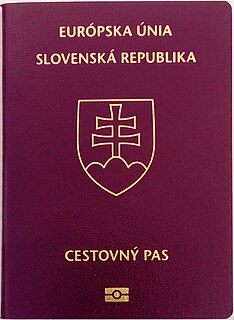 W
WThe Slovak passport is issued to citizens of Slovakia to enable legal international travel. Every Slovak citizen is also a citizen of the European Union. The passport, along with the national identity card allows for free rights of movement and residence in any of the states of the European Economic Area and Switzerland.
 W
WSlovenian passports are issued to citizens of Slovenia to facilitate international travel. Every Slovenian citizen is also a citizen of the European Union. The passport, along with the national identity card allows for free rights of movement and residence in any of the states of the European Union, European Economic Area and Switzerland.
 W
WSpanish passports are issued to Spanish citizens for the purpose of travel outside Spain. Every Spanish citizen is also a citizen of the European Union. The passport, along with the national identity card, allows for free rights of movement and residence in any of the states of the European Union, European Economic Area, and Switzerland.
 W
WSwedish passports are issued to nationals of Sweden for the purpose of international travel. Besides serving as proof of Swedish citizenship, they facilitate the process of securing assistance from Swedish consular officials abroad.